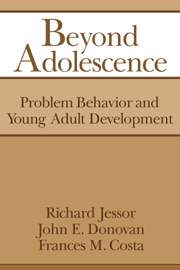Book contents
- Frontmatter
- Contents
- List of tables and figures
- Preface
- Part I The approach
- Part II Young adulthood
- 4 The participants as young adults
- 5 Problem behavior in young adulthood
- 6 Psychosocial correlates of problem behavior in young adulthood
- Part III Development and change
- Part IV Conclusions
- Name index
- Subject index
4 - The participants as young adults
Published online by Cambridge University Press: 07 October 2009
- Frontmatter
- Contents
- List of tables and figures
- Preface
- Part I The approach
- Part II Young adulthood
- 4 The participants as young adults
- 5 Problem behavior in young adulthood
- 6 Psychosocial correlates of problem behavior in young adulthood
- Part III Development and change
- Part IV Conclusions
- Name index
- Subject index
Summary
Before engaging the theory-testing and developmental aspects of this research, we present some qualitative information in this chapter about the young adult participants and about the lives they were living. Young adulthood is usually a time of new experiences and expanded responsibilities: Young adults may enter the labor market for the first time; they may begin to live with a partner or marry, and perhaps have children; they may commit themselves to political and religious philosophies that shape their attitudes and guide their behavior; and they may dissolve old friendship ties and establish new ones. To establish a descriptive overview of the context of young adult life, we include information about the areas of political outlook, religion and morality, family life, sexuality and reproductive behavior, work and leisure, friendships, and health. Since the use of alcohol and involvement with other drugs are key problem behaviors and constitute a major focus of the research, the description of young adult involvement in those behaviors is reserved for presentation in the next chapter.
The chapter is organized around two major aspects of young adult life. The first concerns the sociopolitical views and personal beliefs of the men and women in the study. Under this topic, we describe their political attitudes and affiliations as well as their moral beliefs, religious outlooks, and religious memberships. The second aspect refers to the social roles or social locations occupied by the study participants.
- Type
- Chapter
- Information
- Beyond AdolescenceProblem Behaviour and Young Adult Development, pp. 69 - 98Publisher: Cambridge University PressPrint publication year: 1992



